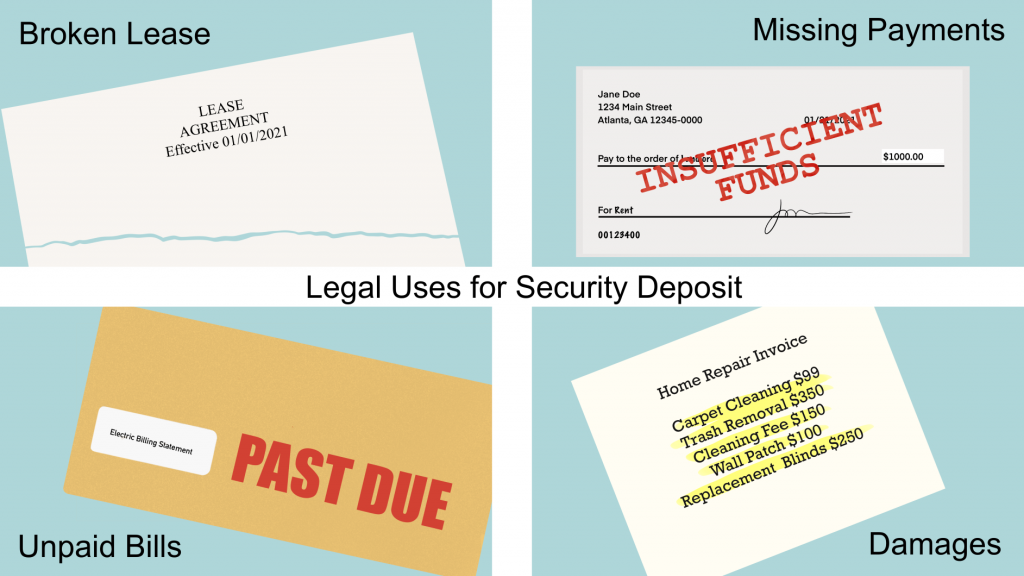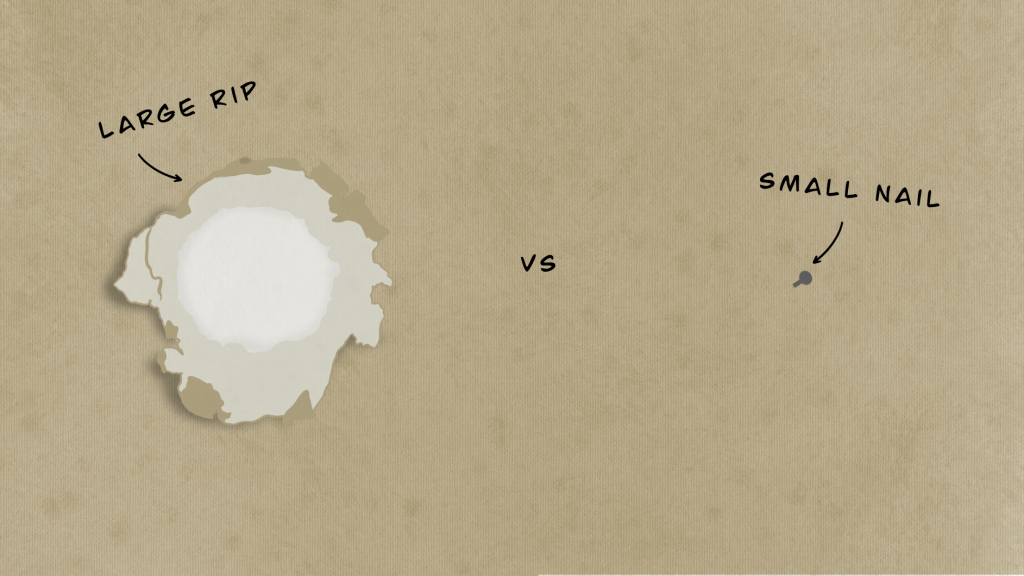Security deposits are the cause of many disputes between landlords and tenants. These disputes, by nature, occur in times of stressful transition for both parties. Tenants are in the process of moving somewhere new; landlords are looking for new tenants.
To avoid these ill-timed conflicts, it’s a good idea to educate yourself about what security deposits are and what your state’s laws say about them, no matter which side of the fence you’re on.
- Security Deposits
- Deposit Amounts
- Security Deposit Use Limits
- Security Deposits: By State
- How to Avoid Conflict
What Exactly is a Security Deposit?
A landlord asks a tenant for a security deposit before move-in day. This is an amount of money that can be used in case a tenant does damage to the property, skips out on a payment, or leaves the place a filthy mess after moving out. If, at the end of the tenancy, no problems or issues arise, the full amount gets refunded.1
The security deposit is a landlord’s way of making sure a tenant will be reliable and respectful. The idea is that even if a renter doesn’t care about the house or the person who owns it, he or she generally cares about getting a considerable amount of money back. States also have laws on whether deposits must be kept in interest-bearing accounts, and what happens to the interest when a tenancy ends. Check our website for a detailed guide to these policies.
How Much is the Deposit?
Several factors impact how much a landlord charges for a security deposit. One is a background check. A landlord might opt to charge someone who looks good on paper — excellent credit, no criminal history, a generally good track record — less for a security deposit. A landlord might also increase the deposit if the property is furnished.2 The potential for damage is higher when there are just more things to break and stain.
The amount charged will also depend on state laws, which vary considerably. Some states don’t cap what a landlord can charge, but many do set limits. These range widely. In New Hampshire, for example, the maximum amount a landlord can collect is $100; in Nevada, the deposit can be up to three months’ worth of rent. The table below lays out the limits in each state, as well as what the law says about how long a landlord has to return a full or partial deposit after a lease agreement is terminated.
What Can a Security Deposit be Used For?
A landlord can use the security deposit for several reasons. One is in the event a tenant “breaks” a lease, or prematurely terminates a contract that doesn’t have an early termination clause in it. In this case, the deposit can be used as rent while the landlord searches for a new tenant. A deposit can be used to cover a missed rent payment, or to cover an outstanding utility bill after a tenant moves out. Essentially, it can be used to remedy a violation of the lease agreement.

The security deposit can also be used to repair damage to the property after the tenant moves out. This is where things get a little complicated. A landlord can use a deposit to rectify problems a tenant caused, but not to pay for fixing “wear and tear.”3 Examples of wear and tear are small stains, mildew in the showers, a loose knob, thinning carpet. These are things that would probably occur no matter who’s living on the property.4 They are some of the inevitable inconveniences and maintenance costs that come with homeownership.
If, however, a tenant leaves behind holes in the walls, cracked countertops, broken appliances, or any other damage that could have been prevented, the landlord can use the security deposit to cover the cost of repairs. The same concept applies to cleaning; it would be unreasonable to charge a tenant for cleaning the property to turn it over, for example, because this is part of doing business as a landlord. It would, however, make sense to use a deposit to hire a cleaner if the tenant leaves belongings strewn throughout the house and a veritable mess behind.5

Limits by State
State |
Limit |
Returned Within |
Laws |
| Alabama | 1 month’s rent | 60 days | § 35-9A-201 |
| Alaska | 2 months’ rent | 14 days | § 34.03.020, § 34.03.070 |
| Arizona | 1.5 month’s rent | 14 days (except weekends and holidays) | § 33-1321 |
| Arkansas | 2 months’ rent | 60 days | § 18-16-304, § 18-16-305 |
| California | 2 months’ rent for unfurnished properties, 3 months’ rent for furnished | 60 days | § 1950.5 |
| Colorado | No limit | 1 month (2 if not mentioned in lease agreement) | § 38-12-103, § 38-12-104 |
| Connecticut | 1 month’s rent (2 months’ if younger than 62) | 30 days | § 47a-21 |
| Delaware | 1 months’ rent for 1-year leases, no limit for all others | 20 days | § 5514 |
| Florida | No limit | 30 days (15 days if no deductions) | § 83.49 |
| Georgia | No limit | 1 month | § 44-7-34 |
| Hawaii | 1 month’s rent | 14 days | § 521-44 |
| Idaho | No limit | 30 days (21 days if not mentioned in lease agreement) | § 6-321 |
| Illinois | No limit | 30 days (45 days if no deductions) | 765 ILCS 710/1 |
| Indiana | No limit | 45 days | IC 32-31-3-12 |
| Iowa | 2 months’ rent | 30 days | § 562A.12 |
| Kansas | 1 month’s rent for unfurnished properties, 1.5 months’ for furnished | 30 days | § 58-2550 |
| Kentucky | No limit | 60 days | § 383.580 |
| Louisiana | No limit | 1 month | § 3251 |
| Maine | 2 months’ rent | 30 days | § 6032, § 6033 |
| Maryland | 2 months’ rent | 45 days | § 8-203 |
| Massachusetts | 1 month’s rent | 30 days | § 15B |
| Michigan | 1.5 months’ rent | 30 days | § 554.602, § 554.609 |
| Minnesota | No limit | 3 weeks | § 504B.178 |
| Mississippi | No limit | 45 days | § 89-8-21 |
| Missouri | 2 months’ rent | 30 days | § 535.300 |
| Montana | No limit | 30 days (10 if no deductions) | § 70-25-202 |
| Nebraska | 1 month’s rent | 14 days | § 76-1416 |
| Nevada | 3 months’ rent | 30 days from termination of tenancy | NRS 118A.242 |
| New Hampshire | 1 month’s rent or $100, whichever is greater | 30 days | § 540-A:6, § 540-A:7 |
| New Jersey | 1.5 months’ rent | 30 days | § 46:8-19 |
| New Mexico |
1 month’s rent No limit for leases longer than 1 year |
30 days |
|
| New York | 1 month’s rent | 14 days | § 7-108 |
| North Carolina | 2 months’ rent | 30 days if no deductions, 60 days if deductions | § 42-51, § 42-52 |
| North Dakota | 1 month’s rent | 30 days | § 47-16-07.1 |
| Ohio | No limit | 30 days | § 5321-16 |
| Oklahoma | No limit | 45 days | § 41-115 |
| Oregon | No limit | 31 days | ORS 90.300 |
| Pennsylvania | 2 months’ rent | 30 days | § 250.511a, §250.512 |
| Rhode Island | 1 month’s rent | 20 days | § 34-18-19 |
| South Carolina | No limit | 30 days | § 24-40-410 |
| South Dakota | 1 month’s rent | 14 days if no deductions, 45 days if deductions | § 43-32-6.1 |
| Tennessee | No limit | 30 days | § 66-28-301 |
| Texas | No limit | 30 days | § 92-103 |
| Utah | No limit | 30 days | § 57-17-S3 |
| Vermont | No limit | 14 days (60 days if a seasonal property) | § 4461 |
| Virginia | 2 months’ rent | 45 days | § 55.1-1226 |
| Washington | No limit | 20 days | § 59.18.280 |
| West Virginia | No limit | 60 days unless property is re-rented within 45 days, then immediately | § 37-6A-1 |
| Wisconsin | No limit | 21 days |
|
| Wyoming | No limit | 30 days | § 1-21-1208 |
Avoiding Conflict
Whether you’re a landlord or a tenant, there are some things you can do to avoid conflict over a security deposit. It’s a good idea to understand the ins and outs of your lease agreement. Does your agreement have an early termination clause in case a tenant breaks a lease? How will the security deposit be handled if one roommate moves out and another remains? How long does a landlord in your state have to return all or part of the deposit? Browse our selection of form-fillable lease agreements to get a better idea of what to include in yours.
It’s a good idea to get footage of the property before move-in day, with timestamps to prove when it was shot. It’s like renting a car — usually, the renter and a representative of the rental company walk around the car together, take photos, take videos, and document the details of its condition before the renter drives away in it. This can be used as evidence in the event of a dispute.
It’s also a good idea to keep a paper trail of complaints registered throughout the tenancy. If you’re a tenant, you’ll want to clean, patch holes in the wall, and take care of repairing any damage you caused before you move out so you can increase your chances of getting a refund. You can also ask for an inspection so you and the landlord can assess and document the state of the property together and you won’t be surprised by anything you get in the mail. If, after all that, you disagree with how your landlord handles your security deposit, you can write a “demand letter,” or a formal letter in which you identify what you think you’re entitled to get back and a deadline you’d like to receive it by.6
Sometimes, these disputes over deposits end up in litigation. Tenants often sue in a small claims court; some even sue for damages. Whether you’re a landlord or a tenant, one way to avoid this kind of conflict is to fully understand the ins and outs of your lease agreement and your state’s laws. We’re eForms, the largest online database of free legal forms, and we can help you with both.
Sources
- https://updater.com/moving-tips/what-is-a-security-deposit/
- https://www.apartments.com/blog/everything-you-need-to-know-about-your-security-deposit
- https://www.courts.ca.gov/selfhelp-eviction-security-deposits.htm?rdeLocaleAttr=en
- https://www.tobenerlaw.com/how-to-get-entire-security-deposit-back-from-landlord/
- https://www.thebalancesmb.com/keep-a-tenants-security-deposit-2124998
- https://www.learnthelaw.org/step-1-figure-out-when-you-can-send-your-demand-letter
